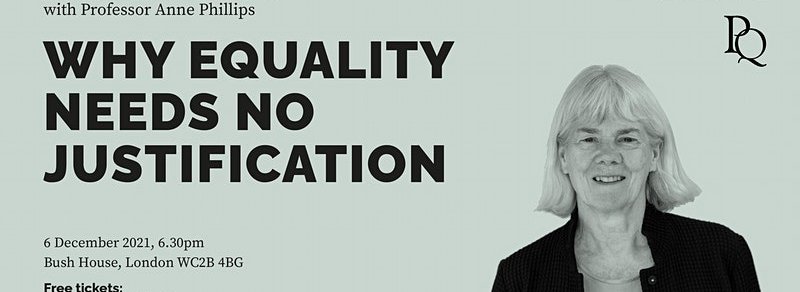About this event
Professor Anne Phillips explores the dangers of treating equality as conditional upon supposedly shared human characteristics.
A defining characteristic of modernity is meant to be that humans recognise each other as fundamentally equal. That’s a nice thought – but is it true?
In this year’s Political Quarterly annual lecture, Professor Anne Phillips argues that basic ideas of human equality are more fragile that meets the eye.
For centuries, inspiring declarations of equality have been depend on the possession of some property, such as rationality, a capacity for autonomy, or a sense of justice. These early articulations of equality gave with one hand and took away with the other, setting up a test that many millions have historically been deemed to fail: women, the enslaved, the colonised, and those too poor to be considered fully human.
The legacy of this conditionality continues today – in philosophical argument, in public policy, and in everyday talk, where we still find ourselves thinking of equality as conditional on being a certain type of human being. One implication is that we cannot be confident of a shared belief in even ‘basic’ human equality, not to mention the kind of socio-economic equality usually associated with those on the left.
Instead of relying on human nature, Phillips makes a powerful case for seeing equality as genuinely unconditional; a commitment we make to ourselves and others.
Further information
Anne Phillips is the Graham Wallas Professor of Political Science at the London School of Economics. She was previously Director of the LSE Gender Institute, one of the largest centres for gender teaching and research in Europe. Her publications include The Politics of Presence (1995), Multiculturalism without Culture (2007); Gender and Culture (2010); Our Bodies, Whose Property? (2013); and The Politics of the Human (2015). She holds honorary degrees from the Universities of Aalborg and Bristol. She was elected a Fellow of the British Academy in 2003 and of the (British) Academy of Social Sciences in 2012.
Tickets
Tickets are free. We have to overbook to allow for no-shows. While we do not expect to have to turn people away, this does mean we cannot guarantee everyone a place. Admission is on a first come, first served basis.


